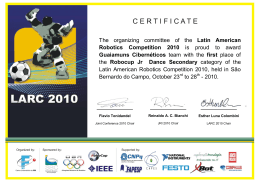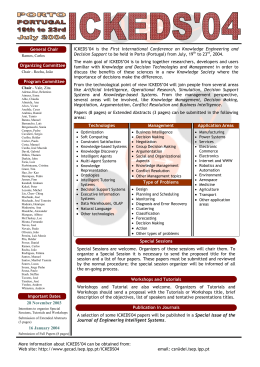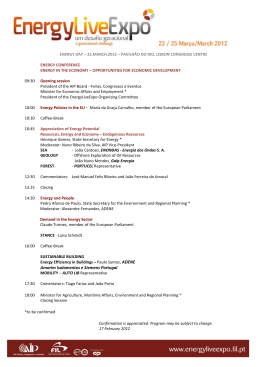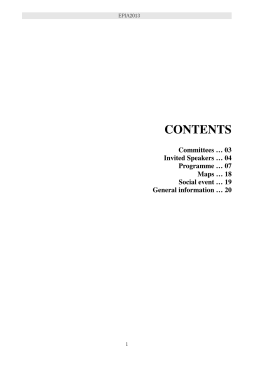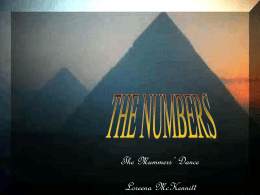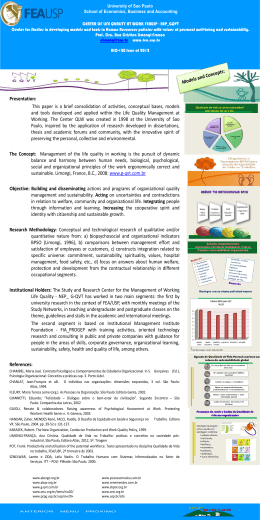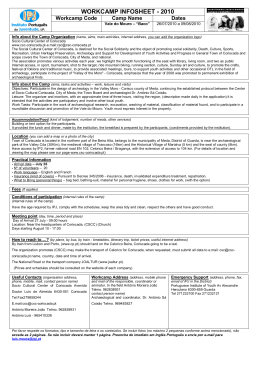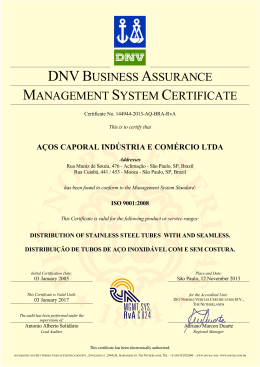•••••••••••••••••••••••• EPIA 2011 Programme •••••••••••••••••••••••• ••••••••••••••••••••••••••• Monday, October 10, 2011 ••••••••••••••••••••••••••• •• 8h45-‐9h00 •• room c6.2.56 •• Opening •• 9h00-‐10h00 •• room c6.2.56 •• Invited Lecture Mathieu d'Aquin Doing Clever Things with the Semantic Web [Chair: H. Sofia Pinto] •• 10h00-‐10h30 Coffee Break •• 10h30-‐12h30 •• room c6.3.38 •• Parallel Session A1 “IRobot 1” [Chair: Luis Correia] Market-‐Based Dynamic Task Allocation using Heuristically Accelerated Reinforcement Learning José Angelo Gurzoni Junior, Flavio Tonidandel and Reinaldo A. C. Bianchi Generic Optimization of Humanoid Robots' Behaviours Luís Cruz and Luís Paulo Reis and Luís Rei Humanized Robot Dancing: Humanoid Motion Retargeting based in a Metrical Representation of Human Dance Styles Paulo Sousa, João L. Oliveira, Luís Paulo Reis and Fabien Gouyon A Reinforcement Learning Based Method for Optimizing the Process of Decision Making in Fire Brigade Agents Abbas Abdolmaleki, Mostafa Movahedi, Sajjad Salehi, Nuno Lau and Luis Paulo Reis 1 •• 10h30-‐12h30 •• room c3.1.8 •• Parallel Session A2 “SDIA 1” [Chair: Cesar Analide] A Proposal for Transactions in the Semantic Web Ana Sofia Gomes and José Júlio Alferes Domain-‐Splitting Generalized Nogoods from Restarts Luís Baptista and Francisco Azevedo Studying Researcher Communities using Text Mining on Online Bibliographic Databases Luís Trigo •• 12h30-‐14h00 Lunch •• 14h00-‐16h00 •• room c6.3.38 •• Parallel Session B1 “IRobot 2” [Chair: Luis Paulo Reis] Humanoid Behaviors: From Simulation to a Real Robot Edgar Domingues, Nuno Lau, Bruno Pimentel, Nima Shafii, Luis Paulo Reis and António J. R. Neves Localization of an NXT Lego Robot via infra-‐red beacons Heber Sobreira, Filipe Santos, Hugo Alves and António Paulo Moreira Shop Floor Scheduling In a Mobile Robotic Enviroment Andry Pinto, Luís Rocha, António Paulo Moreira and Paulo Costa Indoor Robot Localization and Navigation Using a Depth Camera João Cunha, Eurico Pedrosa, Cristóvão Cruz, António J. R. Neves and Nuno Lau •• 14h00-‐16h00 •• room c8.2.23 •• Parallel Session B2 “TEMA 1” [Chair: Joaquim Ferreira da Silva] A bootstrapping approach for training a NER with Conditional Random Fields Jorge Teixeira, Luís Sarmento and Eugénio Oliveira Using the Web to Validate Lexico-‐Semantic Relations Hernani Costa, Hugo Gonçalo Oliveira and Paulo Gomes Measuring Spelling Similarity for Cognate Identification Luís Gomes and José Gabriel Pereira Lopes Identifying automatic posting systems in microblogs Gustavo Laboreiro, Luís Sarmento and Eugénio Oliveira 2 •• 14h00-‐16h00 •• room c3.1.8 •• Parallel Session B3 “SDIA 2” [Chair: Pedro Rangel Henriques] Arguing over Evidences for Establishing Contracts Pedro Brandão Neto, Ana Paula Rocha and Henrique Lopes Cardoso Software Image for Learning by Observation Paulo R. A. M. Costa and Luís Miguel Botelho The Role of Surprise in Agent-‐based Computational Economics (ACE) Davi Baccan and Luís Macedo •• 16h00-‐16h30 Coffee Break •• 16h30-‐18h30 •• room c6.3.38 •• Parallel Session C1 “IRobot 3” [Chair: Nuno Lau] Integrated Exploration of an Indoor Environment with SLAM Technique Adão De Melo Neto, Paulo Fernando Ferreira Rosa and Paulo Cézar Pellanda Fuzzy Visual Servo Control applied to Autonomous Driving Paulo Goncalves, Paulo Lopes, Pedro Torres and José Sequeira Autonomous calibration for the kicking device of a soccer robot Ricardo Dias, António J. R. Neves and José Luis Azevedo •• 16h30-‐18h30•• room c8.2.23 •• Parallel Session C2 “TEMA 2” [Chair: Joaquim Ferreira da Silva] Determining the Polarity of Words through an Common Online Dictionary António Paulo-‐Santos, Nuno C. Marques and Carlos Ramos A Resource-‐Based Method for Named Entity Extraction and Classification Pablo Gamallo and Marcos Garcia An Exploratory Study on how Temporal Features Impact the Classification and Clustering of Future-‐Related Web Documents Ricardo Campos, Gaël Dias and Alípio Jorge Text Categorization: An extensive comparison of classifiers, feature selection metrics and document representation Filipa Peleja, Gabriel Lopes and Joaquim Silva 3 •• 16h30-‐18h30 •• room c3.1.8 •• Parallel Session C3 “AI4Games” [Chair: Pedro Mariano] Wasp-‐like Agents for Scheduling Production in Real-‐time Strategy Games Marco Santos and Carlos Martinho Identifying Player’s Strategies in No Limit Texas Hold’em Poker through the Analysis of Individual Moves Luís Filipe Teófilo and Luis Paulo Reis Development of a Generic Interface System for Developing Abstract Board Games Ivo Paz Reis and Luis Paulo Reis •• 18h30 Cocktail 4 •••••••••••••••••••••••••••• Tuesday, October 11, 2011 •••••••••••••••••••••••••••• •• 9h00-‐10h00 •• room c1.3 •• Invited Lecture Sophia Ananiadou Extracting semantically enriched events from biomedical literature [Chair: Rui Prada] •• 10h00-‐10h30 Coffee Break •• 10h30-‐12h30 •• room c1.3 •• Parallel Session D1 “TEMA 3” [Chair: João Neto] Managing and Querying a Bilingual Lexicon with Suffix Trees Jorge Costa, Luis Gomes, Gabriel Pereira Lopes and Luis M. S. Russo Using SVMs for Filtering Translation Tables for Parallel Corpora Alignment K. M. Kavitha, Luís Gomes and Gabriel Pereira Lopes Extracting Lexical-‐Semantic Knowledge from the Portuguese Wiktionary Leticia Antón Pérez, Hugo Gonçalo Oliveira and Paulo Gomes Extracting Biographical Sentences from Textual Documents Sérgio Soares, Bruno Martins and Pavel Calado •• 10h30-‐12h30 •• room c8.2.23 •• Parallel Session D2 “KDBI 1” [Chair: Nuno Marques] Bankruptcy Trajectory Analysis on French Companies using Self-‐Organizing Map Ning Chen, Bernardete Ribeiro and Armando Vieira Learning to rank for expert search in digital libraries of academic publications Catarina Moreira, Pável Calado and Bruno Martins Network node label acquisition and tracking Sarvenaz Choobdar, Fernando Silva and Pedro Ribeiro Automatically Enriching a Thesaurus with Information from Dictionaries Hugo Gonçalo Oliveira and Paulo Gomes 5 •• 10h30-‐12h30 •• room c6.3.38 •• Parallel Session D3 “SSM” [Chair: João Balsa] Building Spatiotemporal Emotional Maps for Social Systems Pedro Catré, Luís Cardoso, Luís Macedo and Amílcar Cardoso Modeling and Simulation of Firms’ Growth in Business Markets using the Moran Process Cláudia Moreiras, Cristina Matias and Pedro Campos Imitation based Multi Agent System Sorin Moga and Hervé Le Guen Social Learning and Power Broker Dynamics in Societies in Conflict Seyed Mussavi Rizi, Armando Geller and Maciej Latek •• 12h30-‐14h00 Lunch •• 14h00-‐16h00 •• room c1.3 •• Parallel Session E1 “TEMA 4” [Chair: Luis Moniz] CABLE -‐ Correlated Approach on BiLingual Evaluation Pedro Correia, António Leitão, Luís Macedo and Amílcar Cardoso A Machine Learning Method for Resolving Temporal References in Text Vítor Loureiro, Bruno Martins and Pável Calado Ontology Driven Knowledge Extraction System with Application in e-‐Government Mário Rodrigues, Gonçalo Paiva Dias and António Teixeira Extracting Multiword Expressions using Noun Phrase Enumerations in Specialized Domains: first experiences Merley Da Silva Conrado, Walter Koza, Josuka Díaz Labrador, Joseba K. Abaitua Odriozola, Solange Oiveira Rezende, Thiago Alexandre Salgueiro Pardo and Zulema Solana •• 14h00-‐16h00 •• room c8.2.23 •• Parallel Session E2 “KDBI 2” [Chair: Luis Cavique] Visualizing the Evolution of Social Networks Márcia Oliveira and João Gama Using Data Mining Techniques to Predict Deformability Properties of Jet Grouting Laboratory Formulations over Time Joaquim Tinoco, Antonio Gomes Correia and Paulo Cortez 6 Thematic Fuzzy Clusters with an Additive Spectral Approach Susana Nascimento, Rui Felizardo and Boris Mirkin A New Algorithm for Learning Planning Operators from Unlabelled Execution Traces Hugo Ferreira, Rui Carlos Camacho De Sousa Ferreira da Silva and João José Da Cunha E Silva Pinto Ferreira •• 14h00-‐16h00 •• room c6.3.38 •• Parallel Session E3 “COLA 1” [Chair: Paulo Moura] Optimal Division of Execution Trees David Insa and Josep Silva A Subterm-‐Based Global Trie for Tabled Evaluation of Logic Programs João Raimundo and Ricardo Rocha Data acquisition and modeling for learning and reasoning in probabilistic logic environment Dimitar Shterionov and Gerda Janssens Proximity-‐based Unification Pascual Julián-‐Iranzo and Clemente Rubio-‐Manzano •• 16h00-‐16h30 Coffee Break •• 16h30-‐18h30 •• room c1.3 •• Parallel Session F1 “TEMA 5” [Chair: Victor Rocio] Text classification using Semantic Information and Graph Kernels Miguel Gaspar, Teresa Gonçalves and Paulo Quaresma Ontologising Relational Triples into a Portuguese Thesaurus Hugo Gonçalo Oliveira and Paulo Gomes Named Entity Recognition using Machine Learning techniques Nuno Miranda, Ricardo Raminhos, Pedro Seabra, João Sequeira, Teresa Gonçalves and Paulo Quaresma A minimally supervised approach for question generation: what can we learn from a single seed? Sérgio Curto, Ana Cristina Mendes and Luísa Coheur 7 •• 16h30-‐18h30 •• room c8.2.23 •• Parallel Session F2 “KDBI 3” [Chair: Paulo Cortez] WiMAX traffic analysis and Base stations classification in terms of LRD Cristina Stolojescu, Sorin Moga, Philippe Lenca and Alexander Isar Logical Analysis of Inconsistent Data (LAID) for a Paremiologic Study Luís Cavique, Armando B. Mendes and Matthias Funk Clustering Stock Market values with a Self-‐Organized feature Map Nuno C. Marques and Bruno Silva A stock market crash alarm system based on an Hurst Index Neural Network Alexandre Raposo, Diogo Matos, Carlos Gomes and Nuno C. Marques •• 16h30-‐18h30 •• room c6.3.38 •• Parallel Session F3 “COLA 2” [Chair: Victor Beires Nogueira] A Simple Table Space Design for Retroactive Call Subsumption Flavio Cruz and Ricardo Rocha On the Semantics of Heterogeneous Querying of Relational, XML, and RDF data with XSPARQL Nuno Lopes, Stefan Bischof, Stefan Decker and Axel Polleres Every normal logic program has a 2-‐valued Minimal Hypotheses semantics Alexandre Miguel Pinto and Luís Moniz Pereira •• 18h30 •• room c1.3 •• APPIA General Assembly 8 ••••••••••••••••••••••••••••••• Wednesday, October 12, 2011 ••••••••••••••••••••••••••••••• •• 9h00-‐10h00 •• room c1.3 •• Invited Lecture Cristiano Castelfranchi TRUST: its Nature & Dynamics [Chair: Luis Antunes] •• 10h00-‐10h30 Coffee Break •• 10h30-‐12h30 •• room c1.3 •• Parallel Session G1 “GAI 1” [Chair: H. Sofia Pinto] Unsupervised Music Genre Classification with a Model-‐Based Approach Luís Barreira, Sofia Cavaco and Joaquim Silva A Simulated Annealing Algorithm for the Problem of Minimal Addition Chains Adan Jose-‐Garcia, Hillel Romero-‐Monsivais, Cindy Hernandez -‐Morales, Arturo Rodriguez-‐Cristerna, Ivan Rivera-‐Islas and Jose Torres-‐Jimez Using CBR for Portuguese Question Generation Daniel Diéguez Arias, Ricardo Rodrigues and Paulo Gomes Intention-‐based Decision Making with Evolution Prospection Anh Han The and Luís Moniz Pereira •• 10h30-‐12h30 •• room c8.2.23 •• Parallel Session G2 “KDBI 4” [Chair: Susana Nascimento] Identification of Important Factors to Success of Organizational Data Mining Uroš Bole, Jurij Jaklič, Jure Žabkar and Gregor Papa Attribute Selection in Hedonic Pricing Modeling applied to the Portuguese Urban Housing Market Paulo Batista, Gladys Castillo, João Marques and Eduardo Castro •• 10h30-‐12h30 •• room c6.3.38 •• Parallel Session G3 “ALEA 1” [Chair: Leonardo Vanneschi] Network Regularity and the Influence of Asynchronism on the Evolution of Cooperation Carlos Grilo and Luís Correia 9 Evolving Numerical Constants in Grammatical Evolution with the Ephemeral Constant Method Douglas Augusto, Helio Barbosa, André Barreto and Heder Bernardino Evolving Reaction-‐Diffusion Systems on GPU Lidia Yamamoto, Wolfgang Banzhaf and Pierre Collet Towards Artificial Evolution of Complex Behavior Observed in Insect Colonies Miguel Duarte, Anders Christensen and Sancho Oliveira •• 12h30-‐14h00 Lunch •• 14h00-‐16h00 •• room c1.3 •• Parallel Session H1 “GAI 2” [Chair: João Balsa] Novelty Detection Using Graphical Models for Semantic Room Classification André Susano Pinto, Andrzej Pronobis and Luís Paulo Reis Summarizing Frequent Itemsets via Pignistic Transformation Francisco Guil-‐Reyes and Maria-‐Teresa Daza-‐Gonzalez A Belief Function Model for Ascribing Causality Imen Boukhris, Salem Benferhat and Zied Elouedi Covering Arrays Construction Using OSCAR Oscar Alejandro Carrizales-‐Turrubiates, Nelson Rangel-‐Valdez and Jose Torres-‐Jimenez •• 14h00-‐16h00 •• room c8.2.23 •• Parallel Session H2 “AITS 1” [Chair: Rosaldo Rossetti] Operational Problems Recovery in Airlines – A Specialized Methodologies Approach Bruno Aguiar, José Torres and António J. M. Castro Solving Heterogeneous Fleet Multiple Depot Vehicle Scheduling Problem as an Asymmetric Traveling Salesman Problem Jorge A. Ramos, Luis Paulo Reis and Dulce Pedrosa Multiobjective route planning with precalculated heuristics Enrique Machuca and Lawrence Mandow 10 •• 14h00-‐16h00 •• room c6.3.38 •• Parallel Session H3 “ALEA 2” [Chair: Ernesto Costa] The Squares Problem and a Neutrality Analysis with ReNCoDe Rui Lopes and Ernesto Costa Reinsertion of Old Genetic Material: Second Chance GP Mauro Castelli, Luca Manzoni and Leonardo Vanneschi Particle Swarm Optimization for Gantry Control: A Teaching Experiment Paulo Moura Oliveira, Eduardo Solteiro Pires and José Boaventura Cunha The evolution of foraging in an open-‐ended simulation environment Tiago Baptista and Ernesto Costa •• 16h00-‐16h30 Coffee Break •• 16h30-‐18h30 •• room c1.3 •• Parallel Session I1 “GAI 3” [Chair: Luis Antunes] Constrained Sequential Pattern Knowledge in Multi-‐Relational Learning Carlos Ferreira, João Gama and Vítor Costa Using Ontologies to Abstract Relational Databases Conceptual Model Ricardo André Pereira Freitas and José Carlos Ramalho •• 16h30-‐18h30 •• room c8.2.23 •• Parallel Session I2 “AITS 2” [Chair: Rosaldo Rossetti] Real-‐Time Incidents Detection in the Highways of the Future Antonio Pecharromán, Nuria Sánchez, Juan Torres and José Manuel Menéndez A negotiation based approach to Airlines Operations recovery António J. M. Castro, António Pereira, Leonardo Fraga, Ana Paula Rocha and Eugénio Oliveira •• 16h30-‐18h30 •• room c6.3.38 •• Parallel Session I3 “AC” [Chair: Paulo Novais] Sentiment Analysis of News Titles: The Role of Entities and a New Affective Lexicon Daniel Loureiro, Goreti Marreiros and José Neves Empathic Virtual Buddy: Setting Up Informed Empathic Responses Janneke Van Der Zwaan, Virginia Dignum, Joost Broekens and Catholijn Jonker 11 A Theory to Measure Participant Satisfaction in a Meeting Supported by a GDSS João Carneiro, Ricardo Santos, Goreti Marreiros and João Laranjeira •• 20h00 EPIA 2011 Banquet 12 ••••••••••••••••••••••••••••• Thursday, October 13, 2011 ••••••••••••••••••••••••••••• •• 9h00-‐10h00 •• room c1.3 •• Invited Lecture Juan Pavón Agent-‐based modelling: Applications and challenges [Chair: Paulo Trigo] •• 10h00-‐10h30 Coffee Break •• 10h30-‐12h30 •• room c1.3 •• Parallel Session J1 “MASTA 1” [Chair: Paulo Urbano] Doubtful Deviations and Farsighted Play Wojtek Jamroga and Matthijs Melissen A Dynamic Agents' Behavior Model for Computational Trust Maria Joana Urbano, Ana Rocha and Eugénio Oliveira Uncertainty and Novelty-‐based Selective Attention in the Collaborative Exploration of Unknown Environments Luís Macedo, Miguel Tavares, Pedro Gaspar and Amílcar Cardoso The BMC method for the existential part of RTCTLK and interleaved interpreted systems Bozena Wozna-‐Szczesniak, Andrzej Zbrzezny and Agnieszka Zbrzezny •• 10h30-‐12h30 •• room c6.3.38 •• Parallel Session J2 “ALEA 3” [Chair: Sara Silva] Experiments on Controlling Overfitting in Genetic Programming Ivo Gonçalves and Sara Silva A Multi-‐path Planning Approach Based on a Genetic Algorithm for a Robot Fleet Working in Arable Crops Jesus Conesa, Angela Ribeiro and Gonzalo Pajares Partner classification in partner selection Pedro Mariano and Luís Correia Multi-‐caste Ant Colony Optimization Algorithms Leonor Melo, Francisco Pereira and Ernesto Costa 13 •• 10h30-‐12h30 •• room c8.2.23 •• Parallel Session J3 “AIE 1” [Chair: Pedro Rangel Henriques] Organizations of Agents in Information Fusion Environments Dante I. Tapia, Fernando De La Prieta, Sara Rodríguez González, Javier Bajo and Juan M. Corchado Modeling context-‐awareness in agents for Ambient Intelligence: an aspect-‐oriented approach Inmaculada Ayala, Mercedes Amor Pinilla and Lidia Fuentes Providing Location Everywhere Ricardo Anacleto, Lino Figueiredo, Paulo Novais and Ana Almeida Using Multi-‐Layer Perceptrons to Enhance the Performance of Indoor RTLS Dante Tapia, Javier Bajo, Juan Francisco De Paz Santana, Ricardo S Alonso, Sara Rodríguez and Juan M. Corchado •• 12h30-‐14h00 Lunch •• 14h00-‐16h00 •• room c1.3 •• Parallel Session K1 “MASTA 2” [Chair: Eugénio Oliveira] An Agent Decision Model for an Adaptive Supervision of Distributed Systems Cédric Herpson, Amal El Fallah Seghrouchni and Vincent Corruble Meta-‐axioms and Complex Preferences in Evolving Logical Agents Stefania Costantini, Pierangelo Dell'Acqua, Luis Moniz Pereira and Francesca Toni Multi-‐Agent System for Credit Scoring Fábio Silva and Cesar Analide Applying a UML Metamodel to the Requirements Modeling in Multi-‐Agents Systems Projects -‐ The APA Case Study Gilleanes Guedes and Rosa Vicari •• 14h00-‐16h00 •• room c6.3.38 •• Parallel Session K2 “ALEA 4” [Chair: Francisco Pereira] A Method to Reuse Old Populations in Genetic Algorithms Mauro Castelli, Luca Manzoni and Leonardo Vanneschi Noise and Intermediate Asynchronism in Cellular Automata with Sampling Compensation Fernando Silva and Luís Correia 14 •• 14h00-‐16h00 •• room c8.2.23 •• Parallel Session K3 “AIE 2” [Chair: Sara Rodríguez] Developing Dynamic Conflict Resolution Models Based on the Interpretation of Personal Conflict Styles Davide Carneiro, Marco Gomes, Paulo Novais and Jose Neves Automatic Attention Estimation in an Interactive System based on Behaviour Analysis Benedikt Gollan, Bernhard Wally and Alois Ferscha Loosely Coupling between Service and Context in Ambient Computing Environments Ichiro Satoh •••••••••••••••••••••••••••••••••••••••••••••••••••••••••• •• 16h00-‐16h30 •• room c1.3 •• Closing + Drinks •••••••••••••••••••••••••••••••••••••••••••••••••••••••••• 15 ••••••••••••••••••• Best paper award ••••••••••••••••••• The best paper award will be delivered during the conference dinner. Nominees to the best paper award are (by alphabetical order of the first author): n Luís Barreira, Sofia Cavaco and Joaquim Silva o Unsupervised Music Genre Classification with a Model-‐Based Approach (GAI) n Davide Carneiro, Marco Gomes, Paulo Novais and Jose Neves o Developing Dynamic Conflict Resolution Models Based on the Interpretation of Personal Conflict Styles (AIE) n Hernani Costa, Hugo Gonçalo Oliveira and Paulo Gomes o Using the Web to Validate Lexico-‐Semantic Relations (TEMA) n Carlos Grilo and Luís Correia o Network Regularity and the Influence of Asynchronism on the Evolution of Cooperation (ALEA) n Wojtek Jamroga and Matthijs Melissen o Doubtful Deviations and Farsighted Play (MASTA) n Jorge Teixeira, Luís Sarmento and Eugénio Oliveira o A bootstrapping approach for training a NER with Conditional Random Fields (TEMA) 16 ••••••••••••••••• Invited Lectures ••••••••••••••••• Doing Clever Things with the Semantic Web Mathieu d'Aquin The Semantic Web as evolved from a vision of knowledge networks, where ontologies and agents would interact to support users in using online resources, to a platform for the large scale publication of interconnected, linked data. Large amounts of data are now being made available online, relying on the architecture of the Web, and on more or less sophisticated ontologies. This represents an unprecedented resource for researchers and developers, that can be exploited in creating smart applications, as well as to better understand, at a large scale, the practices in data modelling and knowledge representation. In this talk, I will describe research work towards such an exploitation of the Semantic Web, as a planetary scale, interconnected and heterogeneous knowledge base. I will in particular show how the development of our Semantic Web Search engine, Watson, has made it possible not only to create open-‐domain applications able to select and exploit dynamically ontologies from the Web, but also constitutes a platform to study the Semantic Web, ontologies online and the use of semantic technologies in different contexts, domains and applications. I will also show using various examples how the simple mechanisms making up the Web of Data can enable, through creating unexpected connections between various pieces of data, the emergence of new ways of using information, of exploring it and of creating knowledge from it. I will in particular focus on the way Artificial Intelligence techniques, including reasoning, data mining and machine learning can integrate with such mechanisms to create novel smart applications. Dr. Mathieu d'Aquin is a Research Fellow at the Knowledge Media Institute of the The Open University. He obtained is PhD in 2005 from the University of Nancy, France, where he worked on concrete applications of semantic technologies in the medical domain. He is now leading research around concrete solutions for the realization of applications producing and consuming linked data, as well as on more fundamental aspects of the Semantic Web (ontology modularization, evolution and matching, Semantic Web reasoning and analysis). He was a key member of the EU NeOn, and is currently involved in the SmartProducts project applying linked data and Semantic Web technologies in scenarios involving consumer appliances. He was also director of the LUCERO project responsible for setting up the Open University’s Linked Data platform – http://data.open.ac.uk. Dr d’Aquin was Vice-‐Chair for the 2010 conference on Web Intelligence, Chair of the Ontology Track at the Extended Semantic Web Conference 2011, Vice-‐director of the International Summer School on Ontological Reasoning and the Semantic Web in 2009 and 2011, and senior programme committee member for the International Semantic Web Conference in 2011. Mathieu d’Aquin was recognised in 2011 as one of the 10 most promising young researchers in artificial intelligence, through the “AI 10 to watch” award from the prestigious magazine IEEE Intelligent Systems, and has won numerous other awards especially related to innovative applications of semantic technologies (e.g., the ESWC 2011 Best Demo Award and the UK Discovery Developers Competition -‐ http://discovery.ac.uk/developers/competition/). 17 •••••••••••••••••••••• Extracting semantically enriched events from biomedical literature Sophia Ananiadou Much evidence to generate hypotheses for comprehensive diagnostics, treatments, pharmacological interventions, etc. is hidden in text. The type of evidence needed is complex, requiring techniques beyond statistical keyword search mechanisms, such as question answering about biomedical entities and their interactions. In order to infer over a multitude of entities, facts such as genes, proteins, biological processes, functions, experiments, treatments, etc and their associations (including time-‐related aspects), from biomedical literature, we need sophisticated text mining techniques such as event extraction. In addition, the informational context in which events are embedded such as negation, speculation, contradiction needs to be taken into account to understand if an event represents an hypothesis, accepted knowledge or new knowledge. Semantically enriched events can been used to develop advanced search systems. Sophia Ananiadou is Director of the UK National Centre for Text Mining (NaCTeM), and Professor of Computer Science in the School of Computer Science, University of Manchester, UK. She is the main designer of the text-‐mining tools and services currently used in NaCTeM, i.e. terminology management, information extraction, intelligent searching, and association mining. Her research projects include text mining-‐based visualisation of biochemical networks, data integration using text mining, building biolexica and bio-‐ontologies, automatic event extraction of bioprocesses, as well as text mining based search for the UKPMC project and other text mining infrastructure work. She has been awarded the Daiwa Adrian prize (2004) and the IBM UIMA innovation award (2006, 2007, 2008) for her work on interoperability of text-‐mining tools in biomedicine. She has over 160 publications in journals, conferences and books. 18 •••••••••••••••••••••• TRUST: its Nature & Dynamics Cristiano Castelfranchi Trust is a complex notion -‐ with various components and dimensions-‐, and a multi-‐role relation: Trust (x y t G c); x trusts y as for action/task t useful for goal G, in context c. It is an attitude, a disposition towards another agent (natural, technical, or social) on which our ‘welfare’, that is, the realization of some goal of us, depends. This attitude makes us disposed to expose ourselves to failure or damage by relying on y for satisfying our goal. This attitude towards y can be based just on feelings of safety and perceived benevolence, or on feelings due to the analogical evocation of previous or similar positive experiences; or it is more ‘rational’, or better ‘reason-‐based’, grounded on some specific beliefs, evaluations, and expectations about y, that justify our reliance. On the basis of this positive expectation and evaluation we decide to depend on y. Thus, trust also is a decision and an act: the act of trusting y as for t, of exposing ourselves to dependence. And it also becomes a specific relation between x and y. Trust in y (on the basis of the strength of our beliefs or feelings) can be sufficient or insufficient for our decision to delegate; depending on the perceived risk and possible harm. The evaluation of y, on which the expectation is based, has two basic components: (i) y’s ‘competence’, efficacy, expertise: ‘Is y really able and in condition to perform the expected ‘action’ and produce the desired outcome?’ (ii) y’s ‘willingness’: ‘Will y actually perform the needed action?’, ‘Is y predictable, reliable?’, ‘Is y really willing to do the expected action?’. Clearly these two kinds of evaluation are rather independent: y can be very well disposed but not really skilled; or y can be really able but not credible. Moreover, trust as judgment implies the ‘internal attribution’ to y of skills, qualities, ‘virtues’; but it also imply some evaluation about the ‘external’ favorable or adverse contextual conditions for y’s action. This is why not necessarily y’s failure entails a decreasing of y’s trustworthiness; it might not be his fault, but just due to ‘external’ interferences. Trust in not only ‘social’, addressed towards other persons; it can be also towards some process or mechanism (I can trust or not a given elevator), and technology: how much effective and good is it as for its service; how much reliable and predictable; how much accessible and friendly;...? The opposite (but complementary) side of trust is the perceived risk and the perceived unreliability or unmanageability of the technology. Trust dynamics is a very important and complex issue, with many aspects. On the one side, there is the problem of trust transitivity: if x trust y, and y trust z, will x trust z? Not automatically: it depends on the specific object of those trust relations. If x trust y ‘as good evaluator of t performances’ and y trust z as for t, then x will trust z as for t. On the other side, there is the general problem of trust transfer: (a) If x trust y as for t, will x trust y also for another task t? It depends: do the qualities, skills, needed for successfully performing t overlapping with the quality needed for t? If ‘Yes’, the trustworthiness of y as for t is a good predictor of y’s trustworthiness also for t?. 19 (b) If x trusts y as for t, will x trust z for t? It depends on the similarity between y and z: does z have the same qualities of y necessary for t? Another important dynamics is trust as self-‐fulfilling prophecy. Trust is an expectation, but this expectation can affect the expected outcome, both its probability and quality. In fact, on the one side x’s positive evaluation of y can increase y’s commitment, effort, self-‐ esteem, etc. and influence the quality of y’s performance. On the other side, the fact that x is or becomes dependent on y can increase y’s ‘benevolence’ or responsibility towards x. In general, it is well known that trust can induce trust and reciprocation, while diffidence elicits diffidence. Finally, those dynamics can be taken into account even in x’s evaluation and decision to trust: perhaps x’s trust in y would not be sufficient, but x predicts that his act of trusting y will increase y’s reliability and performance, thus trust becomes enough and x decides to trust/rely on y. Trust technology. Trust is a very dialectic and dynamic phenomenon, and it should acquire the same level of quality with technology. There are two different (but not independent) perspectives on that: (i) A technology really able to support social trust relations and to create new trust dimensions among humans. (ii) A trustworthy technology deserving and eliciting trust disposition, which is not at all just a matter of ‘security’, like engineers currently believes. Cristiano Castelfranchi Full professor of "Cognitive Sciences" at the University of Siena, Department of Communication Science; Director of the Institute of Cognitive Sciences and Technologies-‐ ISTC of the National Research Council, in Roma. Cognitive scientist, with a background in linguistics and psychology, he is active in both the Multi-‐Agent Systems, the Social Simulation, and the Cognitive Science communities. Program chair of the First International Joint Conference on Autonomous Agents and Multi-‐Agent Systems – AAMAS-‐2002; General co-‐chair of the last International Joint Conference on Autonomous Agents and Multi-‐Agent Systems – AAMAS-‐2009; chair of several international workshops in these fields (like ATAL; “Trust and Deception in Artificial Societies”); advisory member of several international conferences and societies (like Cognitive Science; IFMAS); member of the editorial board of "J of Autonomous Agents and MAS", of "Cognitive Science Quarterly", of the MIT CogNet; promoter of the Italian Association for Cognitive Sciences, and of the special interest group on Agents of the AI*IA. Award as “fellows” of the European Coordinating Committee for Artificial Intelligence, for “Pioneering work in the field”; August 2003 PhD Honoris Causa in Cognitive Science at the University of Torino; Award “Mind and Brain” 2008. Univ of Torino. Invited speaker at IJCAI'97 (and many other conferences and workshops in AI, logic, philosophy, linguistics, and psychology, economics). Research fields of interest include cognitive approach to communication (semantics and pragmatics); cognitive agent theory and architecture; multi-‐agent systems; agent-‐based social simulation; social cognition and emotions; cognitive foundations of complex social phenomena (dependence, power, cooperation, norms, organization, social functions, etc.). More than 200 conference and journal articles on cognitive, computational and formal-‐theoretical models of social interaction and social mind. 12 books in Italian 20 •••••••••••••••••••••• Agent-‐based modelling: Applications and challenges Juan Pavón Nowadays, there are tools that facilitate programming, executing and monitoring of agent-‐based simulations. They have been successfully applied in a number of cases, gaining the interest of the social scientists as a complementary method for their work. However, most of the agent-‐based models developed so far are quite simple, which is enough to validate some particular assumptions of the social theories, but it has to be shown how agent based modelling can scale to work with real complex systems made of complex systems themselves. A way to cope with this is to integrate knowledge and expertise from the multi-‐agent systems community, which is often disregarded, as well as from other disciplines of artificial intelligence and software engineering. Juan Pavón is Full Professor at Universidad Complutense of Madrid (UCM). He got a PhD degree in Computer Science from Universidad Politécnica Madrid (1988). From 1987 to 1997 he was working in R&D departments of Alcatel in Spain, France and Belgium, and in Bellcore (USA), in the development of component-‐based architectures for distributed systems, and their application to multimedia services on broadband networks and mobile systems. He joined UCM at the end of 1997, where he created the GRASIA research group, whose focus is on the application of multi-‐agent systems technology, in particular, on software engineering, knowledge management, simulation of complex systems, decision making, interactive art, and ambient assisted living. The research is application-‐oriented, and has driven to the definition of a methods and tools for the development of multi-‐agent systems (INGENIAS), and agent-‐based simulation (SiCoSSyS). He is the author of more than one hundred publications in conferences and journals. He will be Chairman of the next IBERAMIA conference to be held in November 2012 in Cartagena de Indias (Colombia). 21 ••••••••••••••••••• Social Programme ••••••••••••••••••• •• Welcome Reception 18h30 Monday, October 10, 2011 Lawn outside c1/c8 •• Conference Dinner (not included, please purchase tickets from Agência Abreu) 20h00 Wednesday, October 12, 2011 Restaurante Nacional 100 Maneiras Rua de São Bento 209, 1250-‐219 Lisboa (+351 21 397 54 67) •• Final drinks 16h00 Thursday, October 13, 2011 Amphitheatre c1.3 22 •••••••••••••••••••••• General Information •••••••••••••••••••••• •• Registration desk Will be located in the entrance of building c8 Open every conference day from 8h30 to 18h00 •• Official opening session Monday, October 10, 8h45 Amphitheatre c3.2.56, followed by •• Welcome Reception 18h30 Monday, October 10, 2011 In the lawn outside c1/c8 •• Conference dinner (Not included, please purchase tickets form Agência Abreu) 20h00 Wednesday, October 12, 2011 Restaurante Nacional 100 Maneiras Rua de São Bento 209, 1250-‐219 Lisboa (+351 21 397 54 67) •• Coffee breaks Monday 10 to Thursday 13, October, 2011 10h00-‐10h30 and 16h00-‐16h30 Served in the entrance of building c8 •• Lunches Monday 10 to Thursday 13, October, 2011 12h30-‐14h00 Served in the lobby of building c6 •• Internet access Available all over the campus through network “eduroam” Participants may use the following authentication: User name: [email protected] Password: epia2011 •• Official closing session Thursday, October 13, 16h00 Amphitheatre c1.3, followed by •• Final drinks 16h00 Thursday, October 13, 2011 Amphitheatre c1.3 23 •••••••••• Sponsors •••••••••• 24
Download
